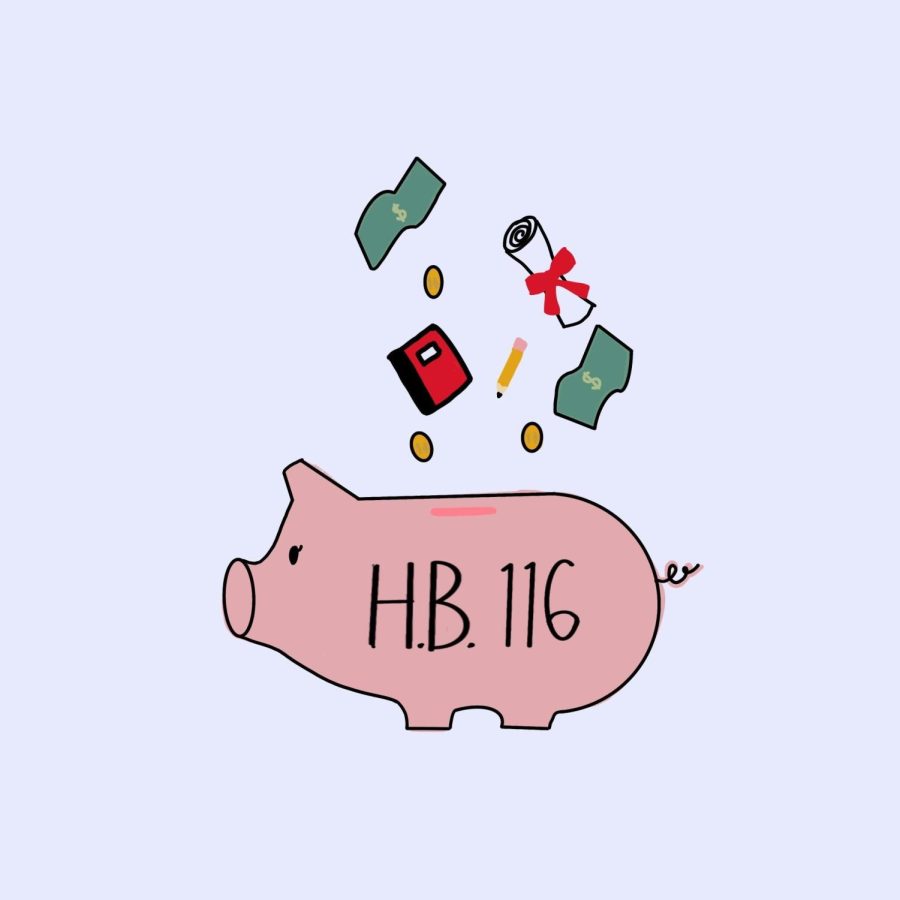Lien: H.B. 116: Ending Intergenerational Poverty
(Graphic by Brenda Payan-Medina | The Daily Utah Chronicle)
March 8, 2023
H.B. 116, “Intergenerational Poverty Solution” aims to stop the cycle of poverty with an educational savings program and is a good first-step towards alleviating Utah’s class divides.
The bill, sponsored by Rep. Norman Thurston, has been in the works for four years and owes its conception to the Intergenerational Poverty Initiative, from which it gets its name. It hopes to set our focus on intergenerational poverty (IGP) in Utah and help those suffering from IGP rather than situational poverty.
Utah defines IGP as experiencing poverty in two or more successive generations, measured through the utilization of public assistance for at least a year as an adult and a year as a child. H.B. 116 establishes the Education Savings Incentive Program for qualifying individuals with an eligible 529 college savings account. An estimated 3,000 Utahns are expected to participate in the program.
This program encourages individuals and families to save for a higher education by matching the money put into the account $1 to $1. The maximum amount matched by the fund is $300 per qualifying individual per year. Once the money is in an individual’s account it is available for them to use for education. If one previously qualified but doesn’t currently qualify, they will not have to pay any of the money back.
Thurston believes this fund will “motivate [impoverished] kids to graduate from high school, go to college or a technical college or some other form of training,” calling it a “pretty good investment.”
Lack of an education or access to education keeps people impoverished. A 2017 paper by UNESCO claims that “if all adults completed secondary school, the global poverty rate would be more than halved.” It follows that this bill attempts to bridge the gaps and encourage people to get a higher education — it’s shown time and time again to reduce the cycle of poverty.
Conceptually, H.B. 116 has a net positive impact. In practice, its effectiveness may be up to debate.
An average University of Utah semester costs around $9,000 just for tuition and fees. If one saved $300 a year, along with the extra $300 that the fund will match, it would still take 15 years to save up enough for a single semester. The fund will match only up to $300, even if there is surplus money left over. It’s a step forward, but perhaps not a large enough one. I can’t help but feel a little disheartened since tuition prices are consistently rising, having increased by 4.63% between 2010 and 2020. The average college tuition has increased 747.8% since 1963.
According to the Intergenerational Poverty Report of Utah 2022, women continue to make up the majority of adults suffering from IGP, and historically have always experienced it at greater rates than men. The report also states that less than 10% of all adults experiencing IGP had a postsecondary education. There is a reason for these trends — access to education opens doors.
Not only does education increase an individual’s job opportunities, it can help them keep their jobs. During the pandemic, Georgetown University’s Center on Education and the Workforce found that the more educated a person was, the more likely they were able to work remotely. A higher education can lead to an improved health and reduced risk of a premature death. Simply speaking, obtaining an education keeps an individual happy and healthy.
If H.B. 116 can encourage students to work towards attending college, this state will be all the better for it. If the Educational Savings fund truly makes a difference in peoples’ lives, good. However, managing to obtain the funding for the program was a feat that should not go unnoticed, especially considering that this bill is unprecedented for Utah.
The pessimist in me, however, believes that $300 a year isn’t enough. Perhaps, with time, the fund will have the ability to match larger amounts that a family has saved. And since it passed, I hope to see what H.B. 116 manages to do moving forward.
Increasing access to education is vital. H.B. 116 is important for Utah and those who live here. Identifying the root of poverty and working to eradicate it is a good first step, and I only hope it is a step in the right direction.









